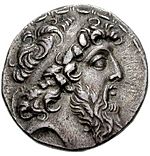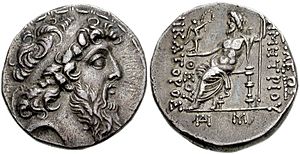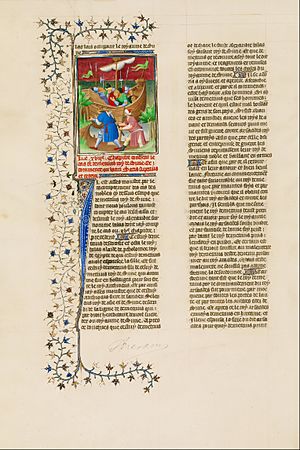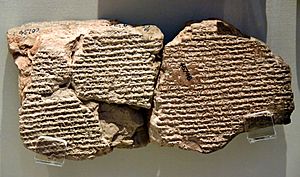Demetrius II Nicator facts for kids
Quick facts for kids Demetrius II Nicator |
|
|---|---|
 |
|
| Basileus of the Seleucid Empire (King of Syria) | |
| Reign | September 145 – July/August 138 BC |
| Predecessor | Alexander Balas |
| Successor | Diodotus Tryphon |
| Reign | 129 – 126 BC |
| Predecessor | Antiochus VII Sidetes |
| Successor | Alexander II Zabinas or Cleopatra Thea |
| Born | c. 160 BC |
| Died | 125 BC (Aged 35) |
| Spouse |
|
| Issue | |
| Dynasty | Seleucid |
| Father | Demetrius I Soter |
| Mother | Laodice V? |
Demetrius II (also known as Nicator, meaning "Victor") was a king of the Seleucid Empire, an ancient Greek kingdom. He was the son of Demetrius I Soter. Demetrius II ruled the Seleucid Empire twice. His first reign was from 145 BC to 138 BC. After being held captive for several years, he ruled again from 129 BC until his death in 125 BC. His brother, Antiochus VII Sidetes, ruled the empire while Demetrius was a prisoner.
Contents
Who Was Demetrius II Nicator?
His Early Life
When Demetrius was a young boy, his father, King Demetrius I, was fighting for control of the Seleucid throne. His father lost the battle to Alexander Balas, and Demetrius's father, mother, and older brother were all killed. Young Demetrius II escaped to Crete, where he was raised by people who looked after him.
Demetrius's First Time as King (147–139 BC)
Winning Against Alexander Balas
Around 147 BC, Demetrius returned to Syria with soldiers from Crete. At this time, Alexander Balas was busy dealing with a rebellion in another part of his kingdom. In 145 BC, Ptolemy VI Philometor, the king of Egypt, marched into Syria. He first pretended to support Alexander Balas, but soon switched his support to Demetrius.
Ptolemy made their alliance stronger by having his daughter, Cleopatra Thea, divorce Alexander and marry Demetrius. Soon after, the city of Antioch gave up to the Egyptian forces. They offered the kingship to Ptolemy VI. However, Ptolemy insisted that Demetrius should be king. He believed that Rome would not allow Egypt and Syria to be united under one ruler. Ptolemy promised to guide Demetrius II, likely intending for Demetrius to be a king he could control.
Alexander returned with his army, but Ptolemy VI and Demetrius II defeated him at the Battle of the Oenoparus river. Alexander then ran away to Arabia, where he was killed. Ptolemy was hurt in the battle and died a few days later. With both his enemy and his "guardian" gone, Demetrius took full control of his kingdom. By late 145 BC, he had removed all Egyptian soldiers from Syria. He also made sure the Seleucid Empire controlled the land all the way to the Egyptian border.
Problems in Antioch
However, new problems quickly appeared. After sending the Egyptian soldiers away, Demetrius let go of many of his own soldiers. It seems he also cut their pay and made the money less valuable. Demetrius had also punished the city of Antioch very harshly. This was because they had supported Alexander against his father. He took away the citizens' weapons, and his soldiers killed many who resisted. This made the people of Antioch very angry. They rose up and surrounded Demetrius in his palace.
Jewish soldiers helped Demetrius regain control. They burned down a large part of the city in the process. This made the city even more against him.
Diodotus's Rebellion
To keep his power, Demetrius removed officials who had supported Alexander Balas. One of these officials, a general named Diodotus, fled to Arabia. There, he found Alexander Balas's young son and declared him king as Antiochus VI Dionysus. Many of Demetrius's soldiers joined Diodotus. They were angry about Demetrius's actions or the cuts to their pay.
Demetrius lost a battle and control of the cities of Apamea and Antioch to Diodotus. Demetrius could not take back the capital city. Instead, he made his base in Seleucia Pieria. Antiochus VI died in 142 or 141 BC, and Diodotus made himself king, taking the name Tryphon. The kingdom was now split between Demetrius in Seleucia and Diodotus in Antioch.
Demetrius II was able to make an important alliance with Simon Thassi, the leader of the Jewish people. He gave them many freedoms. The Jewish state later saw these grants as the moment they became fully independent.
War with Parthia and Capture (139–130 BC)
Mithridates I, the king of Parthia, had taken advantage of the fighting between Demetrius and Tryphon. He took control of new territories in the east. In 139/8 BC, Demetrius traveled east to try and get these lands back from the Parthians. He was successful at first. Even rulers from far-off lands sent soldiers to help him fight the Parthians.
However, Demetrius was defeated in the mountains of Iran and taken prisoner in 138 BC. This meant Parthia kept control of the lands they had taken. In Syria, Tryphon was briefly the only ruler of the remaining Seleucid lands. But the Seleucid family regained control under Antiochus VII Sidetes, Demetrius's younger brother. Antiochus also married Cleopatra Thea, Demetrius's wife.
King Mithridates kept Demetrius II alive. He even married him to a Parthian princess named Rhodogune, and they had children. However, Demetrius was restless and tried to escape twice from his exile near the Caspian Sea. The Parthian king did not punish Demetrius's friend who tried to help him escape. Instead, he rewarded the friend for his loyalty. The second time Demetrius tried to escape, Mithridates gave him golden dice. This was a way of saying Demetrius was like a restless child who needed toys. The Parthians treated Demetrius well for political reasons. They wanted to use him later.
In 130 BC, Antiochus Sidetes felt strong enough to attack Parthia. He had great success at first. So, Phraates II, the new Parthian king, made a clever move: he released Demetrius. He hoped the two brothers would start a civil war. However, Antiochus Sidetes was defeated soon after his brother's release and never met him. Phraates II sent people to chase Demetrius, but he managed to return safely to Syria. He got his throne and his queen back.
Demetrius's Second Time as King (130–125 BC)
The Seleucid kingdom was now much smaller and weaker. Demetrius found it hard to rule. His first wife, Cleopatra Thea, did not like her returned husband. He was not popular, perhaps because people remembered his humiliating defeat and the general decline of the empire. People might also have been angry that he lived while many Seleucid soldiers and family members died in Parthia.
Luckily for Demetrius, the Parthian king Phraates II faced an invasion from nomads in the east. The Parthians tried to use captured Greek soldiers against these invaders. But most of these Greeks switched sides, and Phraates was killed in battle. The next Parthian king also had a short reign fighting in the east. This gave the Seleucid Empire a short break from the Parthian threat.
At this time, in Ptolemaic Egypt, there was a power struggle between Queen Cleopatra II and her brother King Ptolemy VIII. Cleopatra II might have asked Demetrius II for help. Around 128 BC, Demetrius II led a military trip to Egypt to "save" Cleopatra II. Many ancient writers said this was a foolish idea, as the Seleucid Empire had so many problems. However, some modern historians think it was a risk that might have paid off. If Ptolemy VIII was truly unpopular, a small force could have caused many people to switch sides.
The plan did not work. Demetrius II camped outside a fortress in Egypt, but Ptolemy VIII's soldiers remained loyal. There were no mass defections. Demetrius's own soldiers rebelled in the desert. King Ptolemy VIII then found another person who could claim to be a Seleucid king. He sent a man named Alexander II Zabinas, who claimed to be the son of Alexander Balas, to fight a civil war against Demetrius. Ptolemy supported Alexander II.
Demetrius spent the rest of his reign fighting a losing battle against Alexander II. He kept the loyalty of some areas, but not the capital city of Antioch. In 126 BC, Demetrius lost a battle near Damascus. He fled to Ptolemais, but his wife, Cleopatra Thea, closed the gates against him. He was captured and then killed on a ship near Tyre. This happened after his wife left him and he was denied safety in a temple.
Alexander II became the new king. Demetrius's queen, Cleopatra Thea, ruled in Ptolemais Akko with two of their sons, Seleucus V Philometor and Antiochus VIII Grypus.
Images for kids
See also
 In Spanish: Demetrio II Nicátor para niños
In Spanish: Demetrio II Nicátor para niños
- List of Syrian monarchs
- Timeline of Syrian history
 | Precious Adams |
 | Lauren Anderson |
 | Janet Collins |






